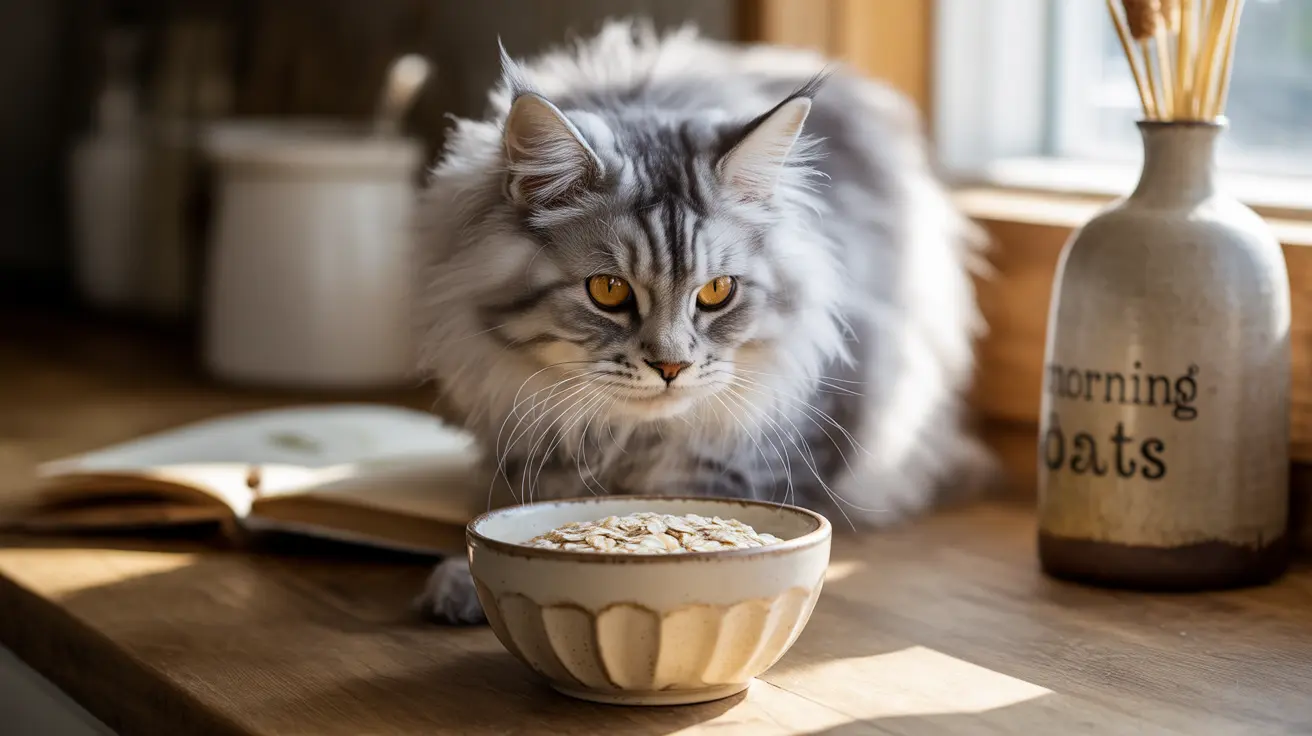Understanding Cats' Nutritional Needs
Cats are obligate carnivores, meaning their bodies are designed to thrive on a meat-based diet. Their digestive systems are specifically adapted to process animal proteins and fats, not plant-based carbohydrates like those found in oatmeal.
Unlike humans who benefit greatly from whole grains, cats have no biological requirement for carbohydrates in their diet. Their natural diet consists primarily of protein, with minimal carbohydrate intake.
Safety and Benefits of Oatmeal for Cats
Plain, cooked oatmeal is not toxic to cats and can be safely offered as an occasional treat. When prepared properly - meaning cooked in water, not milk - oatmeal poses minimal risk to most healthy cats.
- Small amounts of dietary fiber that may aid digestion
- Modest protein content (though not complete for cats)
- Some beneficial fatty acids for coat health
- Can be useful for administering medication when necessary
Proper Preparation Methods
- Cook oatmeal using only water (never milk)
- Serve plain, without any sweeteners or flavorings
- Allow to cool completely before serving
- Start with very small portions (1 teaspoon or less)
- Monitor your cat for any adverse reactions
Potential Risks and Considerations
- Excessive carbohydrate intake can lead to weight gain
- Some cats may experience digestive upset
- Regular consumption could contribute to nutritional imbalances
- Flavored varieties can contain harmful ingredients like xylitol or raisins
When to Avoid Feeding Oatmeal
- Those with grain sensitivities or allergies
- Diabetic cats
- Cats with gastrointestinal issues
- Overweight cats
- Cats on special veterinary diets
Better Alternatives to Oatmeal
- Small pieces of cooked lean meat
- Commercial cat treats formulated for felines
- Freeze-dried meat treats
- Cat grass for fiber needs
Frequently Asked Questions
Is it safe to feed my cat plain oatmeal, and how should I prepare it?
Yes, plain oatmeal is safe for cats when prepared properly. Cook it using only water, avoid any additives or flavorings, and let it cool completely before serving. Always start with a small amount to test your cat's tolerance.
How much oatmeal can I give my cat without causing digestive issues?
Start with no more than 1 teaspoon of cooked oatmeal. If your cat tolerates it well, you can offer up to 1 tablespoon occasionally, but it should never exceed 10% of their daily caloric intake.
Why shouldn't cats eat oatmeal with milk or flavored additives like raisins or cinnamon?
Most adult cats are lactose intolerant, making milk-based oatmeal problematic. Additionally, common oatmeal additives like raisins can be toxic to cats, while artificial sweeteners and spices can cause digestive upset or worse.
Does oatmeal provide any nutritional benefits for cats compared to their regular diet?
While oatmeal contains some fiber and nutrients, it provides minimal nutritional benefit to cats compared to their regular meat-based diet. Cats are obligate carnivores and derive their necessary nutrients most efficiently from animal sources.
Can giving my cat oatmeal regularly lead to health problems or nutritional deficiencies?
Yes, regular oatmeal consumption can lead to problems including weight gain, nutritional imbalances, and digestive issues. Cats require a meat-based diet rich in animal protein and specific nutrients like taurine, which oatmeal cannot provide.
Conclusion
While cats can safely eat plain oatmeal in small amounts, it's best reserved as an occasional treat rather than a regular part of their diet. Always prioritize a balanced, meat-based diet that meets your cat's specific nutritional needs, and consult with your veterinarian before introducing any new foods to your cat's diet.






